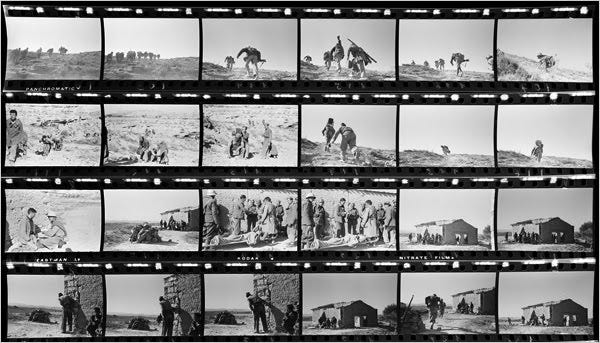The Mexican Suitcase
Negatives (Part 2 of 4: Truth and the Spanish Civil War)

Something I continue to noodle on is the fact that the “good guys” lost the Spanish Civil War. How might the world be different today were that not the case? This week, in Part 2, I recommend a straight-forward documentary that tells the history of a relic that shed light on aspects of the Spanish Civil War. It’s a great chaser to the shot that is Parallel Mothers and will hopefully further broaden your interest and understanding of the war and its significance today.
We open on an excavation. Close-ups of shovels and trowels punching through earth. The film tells us outright: “In 2007, three boxes with over 4500 negatives, popularly referred to as the “Mexican Suitcase” were recovered from a closet by Trisha Ziff in Mexico City…1”
Three photographers are responsible for the photographs: Robert Capa, Gerda Taro, and David Seymour. We move to a scene that will feel immediately familiar to those who have watched Parallel Mothers (Pedro Almodóvar, 2021): However, gone is the exacting hand and framing of a feature narrative director, and present is direct statement of a woman speaking to us about the excavation occurring behind her. They’re searching for her grandmother.
The Mexican Suitcase (Trisha Ziff, 2011) is a documentary that sheds light on a dark period, and it does so with the aid of photographs that had never been seen widely before 2007. Capa, Taro, and Seymour traveled to Spain and worked there from 1936 to 1939; photographing the Spanish Civil War for publications around the world. In the years leading up to WWII, war photography was becoming increasingly important for countries to understand what was going on; not only to sell newspapers and magazines, but to recruit support from sympathetic nations. I encourage you to take a moment and imagine if what has been happening in Syria or Ukraine was even further shrouded in mystery. The impact of war photography on public sentiment could be likened to the impact that social media has had today on sentiment around Ukraine.
Interviews in The Mexican Suitcase with various experts, historians, and families give us valuable context and insight into the mindsets and feelings of descendents of the war. At times it can feel similar to asking a grandparent to recount a painful memory: we can sympathize, but true comprehension always feels just out of reach.
There is more to the title of this film than simply the location where the suitcase was found. Mexico represents a lifeline to Spanish culture; for refugees that fled Spain for Mexico, and even for those who stayed; Mexico was the purveyor of truth in Spanish history for many years. Consider interviewees as they recount their educations in Spain and in Mexico and how they varied. In Mexican schools, the history of the civil war is taught to students as a crucial lesson in the development of a nation. In Spain, for years, the civil war was ignored completely. Buried.
An interesting facet of The Mexican Suitcase, early in the film, is that it’s as interested in the exposing of historical truths as it is in the pursuit of exposing artistic excellence; specifically as it pertains to the three photographers within. Who were these photographers modeling themselves after? Were they pioneers? Have people been running towards danger with cameras for as long as cameras have existed?
“You cannot build a future without your memories.” The film gives little pomp to the photographs as ‘ancient relics.’ Of course, the importance of the photos is emphasized, but by the last third of the film, we move away from celebrating the photographers and we view them in service of the history they represent, and not detached achievements in their own right. This feels like the right choice on the part of the filmmakers and Ziff. Something that strikes me is the similarity in why the Spanish Civil War resonated with US readers of publications like Time-Life Magazine: because Spain was a ‘developed’ nation. The underlying racism in the interest that the US chooses to show selectively holds up today when we view Ukraine. Is there anything that could be done to engender a similar interest from the US on the part of Africa or Syria when they face a crisis?
Ultimately, The Mexican Suitcase strongly makes the case for why truth and information are vital for a country. Even if it’s 100 years later, the truth still matters. There are some beautiful moments during the interviews in this film, captured and edited expertly; one moment that stands out is of a young photographer who never knew his grandparents. He recounts what it means to him to uncover those who have been buried. Towards the end, Anna Winand is considering the miracle of the preservation and discovery of these photographs, and as the camera rolls we see a moment of true introspection; masterfully left in frame despite there being no words for many seconds.
It’s worth pausing and considering the importance of a photo: A document, potentially from a time when information was scarce and governments attempted to craft reality. A photo can show reality.
The Mexican Suitcase
Written and Directed by Trisha Ziff
2011
86 Minutes
Spanish, English
